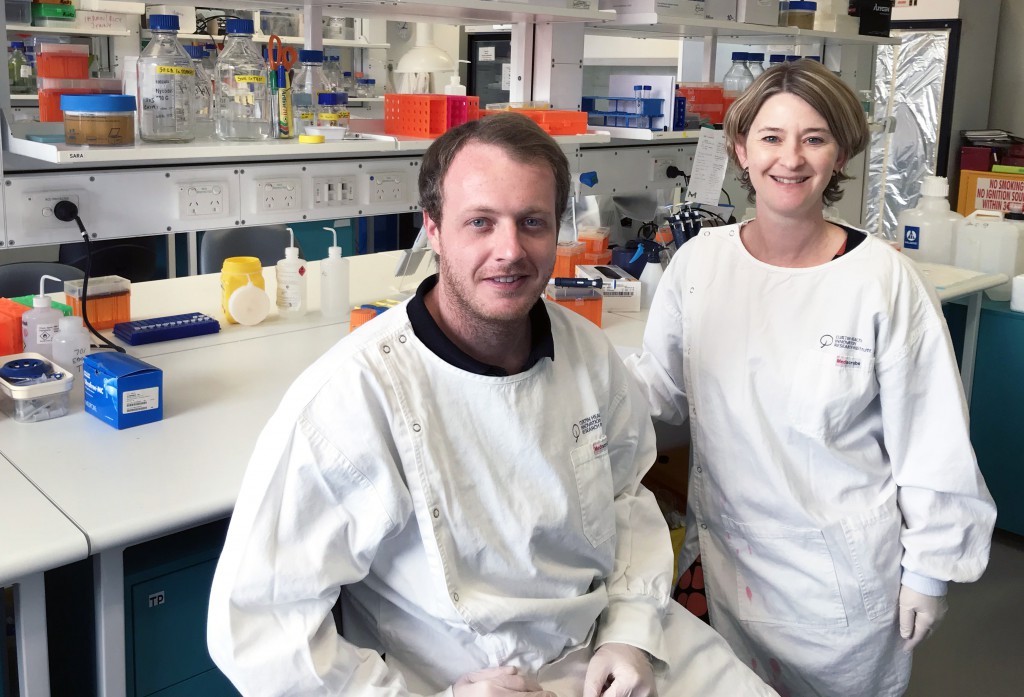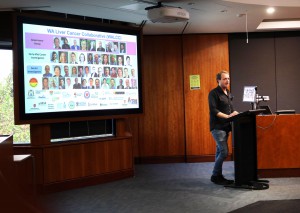
Inaugural Lions-Lotus PhD Scholarship recipient Nathan Main with his CHIRI co-supervisor, Associate Professor Nina Tirnitz-Parker.
Just like the liver functions to detoxify the body, the self-cleaning abilities of the lotus flower, known as ‘the lotus-effect’, are a symbol of long life and health.
The inaugural recipient of the Lions-Lotus PhD scholarship, Nathan Main, is aiming to improve both the lives and health of chronic liver disease patients through his research project at the Curtin Health Innovation Research Institute (CHIRI).
Supported by the Lions Cancer Institute, Nathan’s PhD project is supervised by CHIRI’s Associate Professors Nina Tirnitz-Parker and Pieter Eichhorn, from Curtin University’s School of Pharmacy and Biomedical Sciences, and WA gastroenterologist Professor John Olynyk.
Nathan’s research is focused on decoding the language cells use to communicate, which may contribute to cancer initiation. If found to be significant to liver disease, these cells may be targeted with therapeutics to block liver cancer formation.
Nathan recently presented on his PhD project to representatives from the Lions Cancer Institute, CHIRI and Curtin’s Faculty of Health Sciences and School of Pharmacy and Biomedical Sciences, at a special ceremony announcing his award, as the inaugural Lions-Lotus PhD Scholarship recipient.
“Ultimately, I hope my research will result in new therapeutic approaches to liver cancer, including earlier detection to improve patient outcomes, and better tolerated and more effective treatment options,” said Nathan.

Nathan Main presenting on his PhD project at a special ceremony announcing his award, as the inaugural Lions-Lotus PhD Scholarship recipient.
“I am hoping that by investigating the communication or signalling between liver cells, I will identify novel therapeutic targets to prevent the progression of chronic liver disease to liver cancer and discover biomarkers that can tell us which patients are more likely to develop a tumour.”
Nathan’s appointment to CHIRI’s Liver Disease and Regeneration Group follows his work as a Research Assistant for the Gastroenterology and Liver Laboratory at the Ingham Institute for Applied Medical Research in Sydney.
Nathan is pleased to be back in Perth, having grown up and completed his undergraduate degrees there and is looking forward to applying his knowledge and expertise in the field of liver disease research to his PhD project.
CHIRI Director Professor John Mamo said, “Nathan’s highly-anticipated appointment to CHIRI will help Nina and her research group further explore the potential of their recent research findings, aimed at improving outcomes for liver disease and cancer patients.
“We can’t thank the Lions Cancer Institute and Nina enough for pioneering this scholarship program and supporting student and research excellence at our institute.
“Nathan’s research will contribute to important and ongoing research by Nina and her Liver Disease and Regeneration Group at Curtin-CHIRI, aimed at finding new treatments for liver disease and improving the lives of patients and their families.”
Liver Disease and Regeneration Group researchers recently identified a ‘goldmine’ of genetic markers and protein receptor-ligand pairs that are possible contributors and predictors of liver cancer and provide prime candidates for Nathan’s research.
Nina said with these findings, along with the recent announcement of a $10.8 million boost for primary liver cancer research in WA, Nathan’s appointment could not be more timely.
“Nathan’s appointment comes at a time of unprecedented support for primary liver cancer research in our state, making this a great opportunity to progress both his career and our research,” Nina said.
Nina and Professor Peter Leedman from the Perkins Institute and UWA will co-lead the WA Liver Cancer Collaborative team at a new $10.8 million primary liver cancer research centre for Perth (read the announcement here).
“The establishment of this state-wide collaborative program will provide Nathan with access to a large, multidisciplinary network of clinicians and scientists to guide his research, as well as access to world-class facilities, technologies and clinical samples,” Nina said.
“It’s an exciting time for our research team and for Nathan and I am grateful to the Lions Cancer Institute and CHIRI for this opportunity to nurture the next generation of research excellence through a scholarship dedicated to researching liver disease and cancer.”
You can find out more about the Lions Lotus PhD scholarship here, or give to the program here.